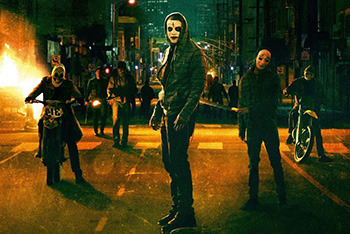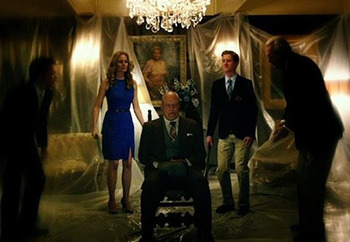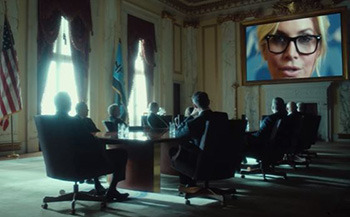5 Legitimate Reasons Why The Purge Would Be Successful

Rejoice! One of my favorite happenings is finally upon us! Of course, I don't mean the Fourth of July. Fireworks are stupid, and quite frankly, it's probably high time a country with better organizational skills take the reins for a while. If freedom means maybe electing Trump, we can obviously do without it for a while. No, what I'm excited about is that there's another installment of The Purge series in theaters right now.
That's good times. I know we were skeptical as a nation at first, but against all odds, The Purge has turned into one of the most consistently entertaining series in recent memory. And that success led me to a fairly obvious question this weekend: Would the Purge actually work in the United States? We debate that very question on this week's Unpopular Opinion podcast ...
... where I'm joined by comic Cat Rhinehart and Cracked art snob Randall Maynard. As for me, I totally think it would work. Here are five reasons why.
It Would Achieve Its Original Goal

At some point in history, a website existed which provided loads of backstory details about the universe that The Purge takes place in. It doesn't exist anymore, and apparently no one cared enough to document any of it extensively online. However, articles similar to the one you're reading now which were published around the time of the first movie did at least preserve some of the information.
For example, this piece from The Week notes that the idea for the Purge came about after "a public outcry for protection and vengeance against the increasing number of homeless." That's important (relatively speaking), because most of the talk about how ridiculous the idea of a Purge is centers around it being sold as a way to decrease crime by allowing average Americans to let out all of their pent-up rage and anger once a year with zero fear of punishment. While it obviously evolved into that at some point, what this forgotten detail reveals is that the program started with a very specific target and goal. It wasn't to reduce crime by giving people the green light to act like savages; it was a declaration of war against the homeless.

It's like Halloween with firearms!
Sorry to have to be the one to say it, but that's an absurdly easy war to win. That's especially true if a combination of high-profile crimes committed by homeless people were coupled in the wrong way with a propaganda campaign which painted the poorest members of society as the greatest threat to the well-being of average Americans. It's not like there haven't been several examples of tyrannical regimes that achieved their goals in large part by convincing the people they ruled over that one particular segment of society was responsible for the ills of everyone else, and thus should be removed entirely. What you see in The Purge, at least at first, started as just another example of something that's happened plenty of times before. It's just that in this case, the targets of the "cleansing" were the homeless instead of a particular ethnic or religious group.
What would make the Purge especially successful is that the enemy in question would have almost no means of defense. It's not like homeless people have the guns in this country. If the United States government convinced the public that homelessness represented a grave threat and gave them 12 hours to go out and deal with that threat in any manner they saw fit, the result would be nothing short of a bloodbath.

And a boon for the novelty assault weapon industry.
In that way, at least for one year, the Purge would be hugely successful. Homelessness would indeed be much less of a concern, because untold numbers of homeless people would be wiped out in one night. How to justify its existence after that first year is an entirely different story, but the government would have public opinion on its side for at least a little while after the inaugural Purge. That's because ...
Less Homelessness Means More Money For Social Services

I guess I should go on record here to confirm that I'm not saying we should institute an annual Purge to deal with homelessness in this country. I'm just saying that it would probably work, and when it did, it would maybe lead to some quality of life improvements for whatever poor people did manage to survive.
You see, our current strategy for dealing with homelessness is to throw money at the problem. At last count, our spending in that area was somewhere around $4.5 billion annually. There's nothing wrong with that. Obviously, money can be an extremely potent weapon in that particular battle. That said, if you eliminate the bulk of the nation's homeless people in one raucous night, you free up a lot of money to spend in other ways.

Tax cuts for the wealthy?
Or even better, you could spend it in a very similar way. Specifically, you could spread that money around to people who need it to stave off homelessness themselves. Sounds awful, I know, but there's at least some evidence that things play out exactly that way in the Purge-friendly version of America. In the opening moments of the first film, there's a statistic which says that violence and unemployment are almost non-existent. There's a good chance that's a smoke-and-mirror kind of thing that doesn't really benefit anyone, and we'll talk about that more in a bit. However, if we're giving the benefit of the doubt, it's just as possible that the Purge led to an influx of available resources which made their way to people living in less extreme forms of poverty. If it's true that there's a link between poverty and crime, this transfer of "wealth" would stand a perfectly fine chance of lessening crime in a large-scale kind of way.

And now everyone has extra money to buy the coolest masks available.
Granted, that would be a temporary benefit, and it would require the mass slaughter of some of the same people the program was meant to help in order to make any sort of sense on a long-term basis. And it probably won't surprise you at all to know that this eventually becomes one of the key plot points of the entire series. Nevertheless, a government with a good enough handle on what information gets disseminated to the people could make it look good for at least the first year or so.
Fewer People And A Burgeoning Purge Industry Means Low Unemployment

Another key feature of life after the Purge is that unemployment reaches record low levels. This seems logical enough to me for a few different reasons. For starters, even though the targets of the annual campaign are the poorest, most vulnerable members of society, it's inevitable that more than a few "middle-class" types (i.e. not homeless) will get swept up in the carnage every year. This exact situation makes up a good portion of the plot of the second movie. That's also the point in the franchise where we learn that, if there aren't enough legitimately poor people to go around, the government sends out armed militias to round up enough people to ensure a "successful" Purge. What that amounts to is scores of able-bodied people exiting the labor pool every year, most of them leaving perfectly decent jobs behind.
Sure, people would be irate if they knew that was happening, and the people who find out about it in the movies are no exception.

Future Omar certainly isn't happy about it.
The problem is, we're a nation that's predisposed to not believing that massive government conspiracies actually happen. There's no reason to believe that the future people who might publicly question the motives and actions of the New Founding Fathers (the political party that came up with idea for the Purge) wouldn't receive the same "conspiracy nut" write-off that we give people who make wild claims about government cover-ups today. We're talking about a government that successfully convinced most of the populace to support a genocide against the homeless. Believing they could also hide their wrongdoing for an extended period of time isn't so unrealistic once you take that into account.
Also, they'd have the benefit of being able to say that the Purge itself creates jobs, because it absolutely would. An entire industry would spring up around the annual event in no time at all. There are the obvious ventures, like finding new and exciting ways to protect people from dying on Purge night. Ethan Hawke's character in the first movie is employed in that exact field.

Meaning he sells baseball bats.
Then there's all the super fun "I Purged!" memorabilia that would be produced and sold every year. What's the point of Purging if you can't put a sticker on your shirt that says you did it, and then take a picture of yourself wearing that sticker and upload it to Facebook?
I'm assuming there would also be people who would go out and Purge and livestream it all on a site like Twitch for money. That's what I would do! Watch it, I mean. Just because I think the Purge could work doesn't mean I want to participate in it. Oh, and since we're back on the subject of things about it that might work, let's talk numbers!
Violent Crime Would Plummet

Okay, I admit right off the bat this would be some absolute smoke and mirrors shit, but in the most technical sense, the Purge would absolutely lead to a dramatic drop in violent crime statistics. The reason for that is really simple: Premeditated murder convictions would disappear almost completely. Statistics for what percentage of homicide convictions are of the first degree vary per year, but this Bureau of Justice Statistics report says the number is around 70 percent, if we're talking about spouse murders. How many of those murders are still going to be on the books if disgruntled soulmates have a dedicated 12-hour window each year during which they can slay their significant other with impunity?
Like in this scene!
That goes for any pre-planned murder. If it's someone close to you, why would you bother doing it any day other than the Purge? Because you might get killed yourself if you risk going out into the streets and/or shacking up for the night with a person who probably wants to kill you too? Whatever, don't be a pussy about it. This is the Purge.
I mean, yeah, science says that committing one crime can sometimes give people a taste for it that makes them keep doing it. That's certainly a thing we'd have to contend with.

"This never gets old!"
And murder definitely isn't the only form of violent crime. I'm not sure how your garden-variety sexual assaulter is going to hold off until the next government-sanctioned crime spree rolls around. But that's beside the point, really. What matters is that, in terms of statistics, the Purge would appear to have a positive impact on crime in the United States. There would be the same amount of crime, obviously, if not significantly more. But still, if you're the kind of person who would support the Purge, you'd most likely accept this cosmetic change in numbers as proof that it's working. That brings us to the last point ...
The Public Would Support It

I've touched on it in pretty much every point so far, but it's worth mentioning again that, in every installment of The Purge franchise so far, the events depicted take place in an America that's still a democracy. Remember, the first Purge happened because the public was clamoring for a way to protect themselves from the homeless. Granted, that information comes from a website that was meant to be written from the point of view of the evil political party that thought up the Purge, and at various points throughout the films and the promotional materials associated with them, it's implied that there might have been some mind control involved in that party coming to power. But again, that doesn't matter. What matters is that, by that point, regardless of the means used to accomplish it, the American public was sold enough on the idea of the Purge to vote it into law.
As mentioned previously, that first Purge would inevitably have some tangible benefits for the country. Not only would that make anyone who voted for it in the first place feel justified in their decision, but it would also likely sway some of those who may have opposed it or been on the fence about it previously.
From there, the government's job of selling voters on the idea that a yearly killing spree is something the country needs becomes a lot easier. The most brilliant thing about the Purge, as far as evil government programs go, is that it quickly evolves into one that feeds on the only segment of society that would be opposed to it in a widespread way, which is poor people.
Like I mentioned earlier, we learn in the second movie that at some point, there aren't enough people participating in the Purge to make it worthwhile, so the government just sends out armies to round people up. This gives them an easy means of shutting down dissent, which would pair nicely with the fact that no one has less representation in a democratic government than poor people. If you think a whole lot of voters wouldn't come to see the Purge (no matter how it's carried out) as a problem that only the significantly less fortunate need to worry about, you've probably never been to America.
As much as the movies try to portray the Purge as a negative thing, they also make it very clear that it still has significant public support. There's a scene in the third movie in which an anti-Purge senator is debating a member of the New Founding Fathers. When he claims that the Purge "saved the country," she doesn't dispute it in the slightest -- she just mutters something about how there are "other ways to do it."

Whatever, mom!
This probably explains why her victory in the election that the film is centered around seems to be far from guaranteed. Yes, the party in power sees her as a threat, but even they acknowledge that she's not winning in the polls. She's just catching up. If those results were propaganda on the part of the New Founding Fathers, they probably wouldn't be worried about it enough to change the rules of the Purge in a way which puts them at risk in order to get rid of her.
What this implies is that, at every step of the way, the people have absolutely had the power to put an end to the Purge, and it would take nothing more than the usual mechanisms of the system of government we have in place now. But they didn't. Election after election, their vote went to the party that supported the Purge.

#AnyoneButTrump
Sounds crazy, I know, but only until you remember that some of history's biggest monsters enjoyed massive public support while they laid the groundwork for their evil plans. Hitler's early efforts to eliminate Jews from society allowed the Nazis to finagle unemployment statistics in a way that made it look like the country had undergone an economic miracle. It was literally called that. "The Nazi Economic Miracle." But all it amounted to was eliminating huge numbers of people from the workforce and giving those jobs to other people, while instituting a war economy at the same time. It "worked," so to speak, but benefiting from that success meant ignoring the awful thing that was happening to a massive segment of the population.
The steps taken to make it happen might be radically different, but the Purge isn't much different than any other genocide throughout history. It has fantastical movie details attached to it that make it seem unbelievable, but at its core, it's an idea that's worked countless times throughout history. It's not a question of if it could ever happen; it's a question of whether it could happen again.
Adam has a podcast you should subscribe to on iTunes, and a Twitter you should follow on Twitter. Do both of those things!
Zoroastrianism used to be one of the biggest religions in the world, but their idea of heaven had a slight twist on it: To get there, you'd have to cross a bridge. Sometimes it was rickety, and sometimes it was wide and sturdy, and if you fell off, you'd go to the House of Lies for eternity. Fun! Not terrifying at all! This month, join Jack, Dan, and Michael, along with comedians Casey Jane Ellison and Ramin Nazer, as they discuss their favorite afterlife scenarios from movies, sci-fi, and lesser-known religions. Get your tickets here, and we'll see you on the other side of the bridge!
Learn why society needs crime in 5 Complex Philosophies (Secretly) Taught To You By Movies, and check out how we would spend our time during the Purge in 21 Rules We Should Suspend/Enforce One Day Each Year.
Subscribe to our YouTube channel to see how it feels like a purge every day in America in How Gun Control Made Australia Safer Than America, and watch other videos you won't see on the site!
Also follow us on Facebook, and see if your bafflingly incoherent insults or compliments can stand out from the rest.





